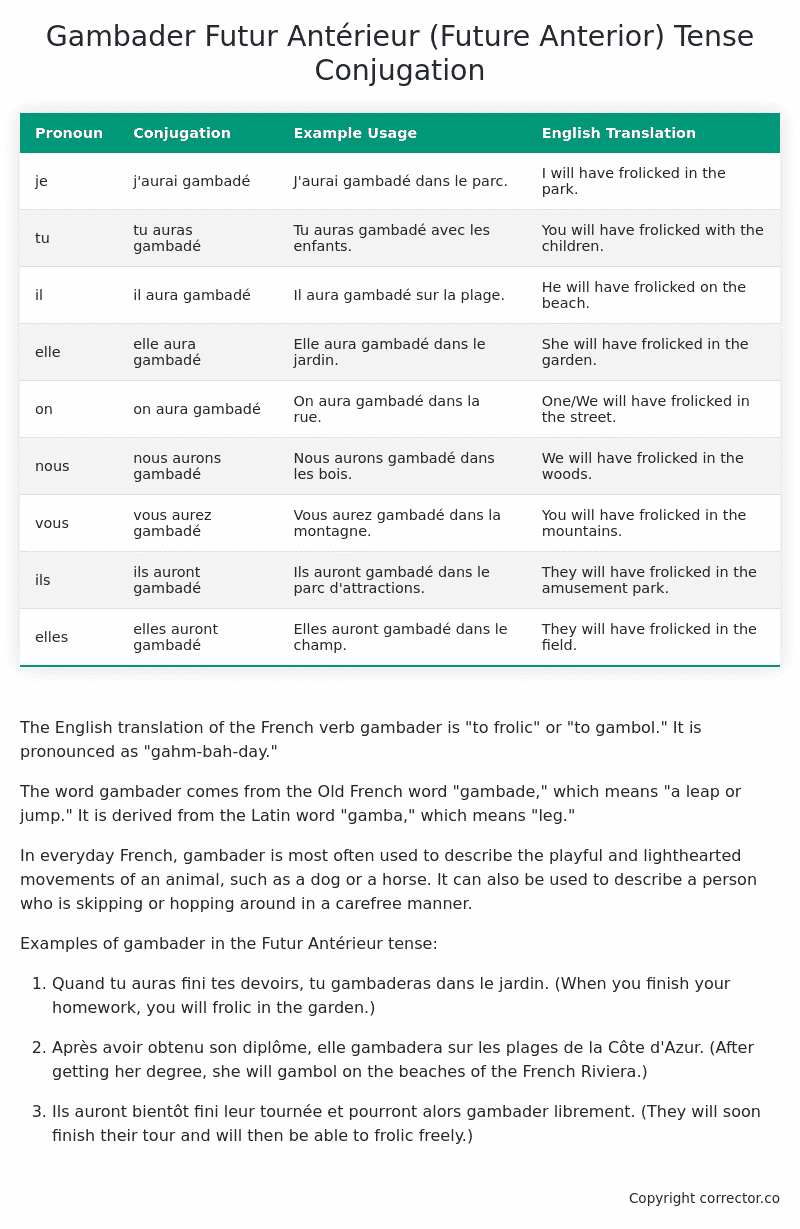Futur Antérieur (Future Anterior) Tense Conjugation of the French Verb gambader
Introduction to the verb gambader
The English translation of the French verb gambader is “to frolic” or “to gambol.” It is pronounced as “gahm-bah-day.”
The word gambader comes from the Old French word “gambade,” which means “a leap or jump.” It is derived from the Latin word “gamba,” which means “leg.”
In everyday French, gambader is most often used to describe the playful and lighthearted movements of an animal, such as a dog or a horse. It can also be used to describe a person who is skipping or hopping around in a carefree manner.
Examples of gambader in the Futur Antérieur tense:
-
Quand tu auras fini tes devoirs, tu gambaderas dans le jardin. (When you finish your homework, you will frolic in the garden.)
-
Après avoir obtenu son diplôme, elle gambadera sur les plages de la Côte d’Azur. (After getting her degree, she will gambol on the beaches of the French Riviera.)
-
Ils auront bientôt fini leur tournée et pourront alors gambader librement. (They will soon finish their tour and will then be able to frolic freely.)
Table of the Futur Antérieur (Future Anterior) Tense Conjugation of gambader
| Pronoun | Conjugation | Example Usage | English Translation |
|---|---|---|---|
| je | j’aurai gambadé | J’aurai gambadé dans le parc. | I will have frolicked in the park. |
| tu | tu auras gambadé | Tu auras gambadé avec les enfants. | You will have frolicked with the children. |
| il | il aura gambadé | Il aura gambadé sur la plage. | He will have frolicked on the beach. |
| elle | elle aura gambadé | Elle aura gambadé dans le jardin. | She will have frolicked in the garden. |
| on | on aura gambadé | On aura gambadé dans la rue. | One/We will have frolicked in the street. |
| nous | nous aurons gambadé | Nous aurons gambadé dans les bois. | We will have frolicked in the woods. |
| vous | vous aurez gambadé | Vous aurez gambadé dans la montagne. | You will have frolicked in the mountains. |
| ils | ils auront gambadé | Ils auront gambadé dans le parc d’attractions. | They will have frolicked in the amusement park. |
| elles | elles auront gambadé | Elles auront gambadé dans le champ. | They will have frolicked in the field. |
Other Conjugations for Gambader.
Le Present (Present Tense) Conjugation of the French Verb gambader
Imparfait (Imperfect) Tense Conjugation of the French Verb gambader
Passé Simple (Simple Past) Tense Conjugation of the French Verb gambader
Passé Composé (Present Perfect) Tense Conjugation of the French Verb gambader
Futur Simple (Simple Future) Tense Conjugation of the French Verb gambader
Futur Proche (Near Future) Tense Conjugation of the French Verb gambader
Plus-que-parfait (Pluperfect) Tense Conjugation of the French Verb gambader
Passé Antérieur (Past Anterior) Tense Conjugation of the French Verb gambader
Futur Antérieur (Future Anterior) Tense Conjugation of the French Verb gambader (this article)
Subjonctif Présent (Subjunctive Present) Tense Conjugation of the French Verb gambader
Subjonctif Passé (Subjunctive Past) Tense Conjugation of the French Verb gambader
Subjonctif Imparfait (Subjunctive Imperfect) Tense Conjugation of the French Verb gambader
Subjonctif Plus-que-parfait (Subjunctive Pluperfect) Tense Conjugation of the French Verb gambader
Conditionnel Présent (Conditional Present) Tense Conjugation of the French Verb gambader
Conditionnel Passé (Conditional Past) Tense Conjugation of the French Verb gambader
L’impératif Présent (Imperative Present) Tense Conjugation of the French Verb gambader
L’infinitif Présent (Infinitive Present) Tense Conjugation of the French Verb gambader
Struggling with French verbs or the language in general? Why not use our free French Grammar Checker – no registration required!
Get a FREE Download Study Sheet of this Conjugation 🔥
Simply right click the image below, click “save image” and get your free reference for the gambader Futur Antérieur tense conjugation!

Gambader – About the French Futur Antérieur (Future Anterior) Tense
Construction
Common Everyday Usage Patterns
Interactions with Other Tenses
For example
Summary
I hope you enjoyed this article on the verb gambader. Still in a learning mood? Check out another TOTALLY random French verb conjugation!


